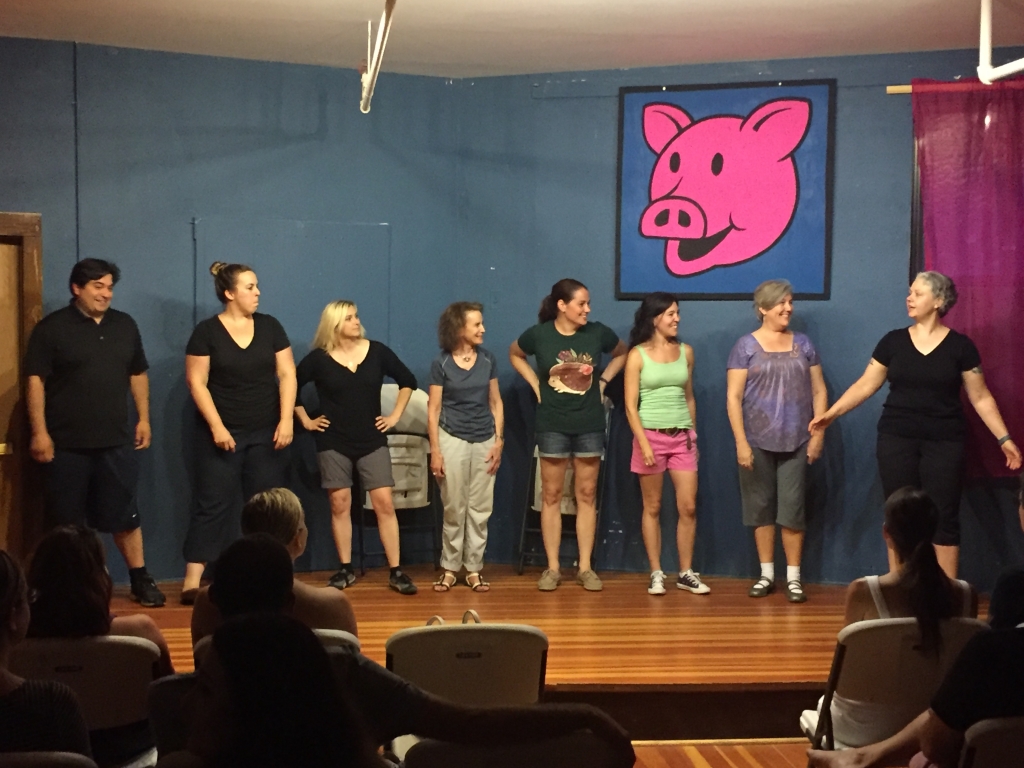
By Kimberly Harper
I’ve always been interested in performing arts. I studied theater in college, I review it now, and occasionally I get on stage. I’ve tried stand up with some success. So when the Providence Improv Guild (to be known as PIG going forward) contacted me about taking their Level 1 improvisational skills class in exchange for a story, I jumped at the opportunity. I figured it would be a lot of fun and help me with stage presence.
PIG is a non-profit organization that provides a venue for local and regional improv artists, hosting multiple shows each weekend in order to promote the arts. They also offer a variety of classes in order to introduce more people to the field, and help more experienced artists hone their skills. My class was taught by Justin Wilder, with PIG’s Artistic Director Melissa Bowler serving as TA.
The first class was held in the basement of the Southside Cultural Center, on Broad Street in Providence. There were around 13 of us, ranging in age from college student on up, in a variety of careers. There was the married couple who had decided to take the class in order to do something together. He was a stand up comedian, she worked with another woman in the class who had brought HER partner along for the ride as well. There was one man who had taken the first couple of classes of Level 1 several times, only to be called away on business trips. Sadly, this was to be no different, and Jason left us to go to China after the second or third class. There was the woman who worked for WPRO. No, I didn’t know her. In what can only be called a case of reverse Rhode Island coincidence, I’d never met Patricia, despite her working for the same station I’m writing this piece for. And there was the woman who took this class solely because she’s obsessed with actor/comedian Jim Carrey. We had bankers. Businessmen. A few mothers, a couple of fathers, and most of us made it to the level 1 final showcase at the end of July. Which brings me to my main point – you don’t have to be an actor, or a comedian, or even an extrovert, to learn some really important life skills in a basic improv class.
“Level 1 helps stimulate empathy,” Bowler said in a sit-down after classes. “You have to see someone else’s perspective.” Bowler also provides improv coaching to businesses, and says that a lot of the exercises and concepts taught can translate into everyday situations,
For instance, a few classes in, we learned the importance of “yes…and” when you are creating a scene out of thin air. If your scene partner tells you, “this zoo really is crowded today!” and you go “what’s the matter with you, we aren’t in the zoo!” then you’ve added nothing to the scene and managed to stop what she had going dead in its tracks. One of the most important things in improv is to agree, agree, agree – and add to the scene. Simply saying “yes” doesn’t do much. You’ve agreed with the reality she’s set up, but you’ve also thrown the ball back into her court without giving her anything new to work with. But if you reply “Yes, it really is, and you’ve sold almost all your hot dogs!” now you’ve opened up a whole new set of directions for the scene to travel. (Novice tip – hot dogs are funny. So are animals.)
Bowler added that both setting up a base reality (who you are, where you are, what your relationship is, etc.) and practicing “yes…and” are useful for conflict management. Base reality highlights where your communication skills may come up short, and gives you a chance to look at yourself.
“You have to lay it all out,” she said. And throughout the eight weeks, that proved true over and over again. Yes, there were jokes and games, but people’s personalities and strengths really began to become apparent the more we worked together. It’s something Bowler says happens often.
“Even the most inexperienced, worst student in class does good things at some point and makes people laugh…I’ve never seen a student not improve in eight weeks. They come out better than they go in.”
And even the experienced beginner has a lot to learn. I wasn’t going into this unprepared. I figured I would be pretty good at the whole improv thing, especially since I had recently completed Frank O’Donnell’s Stand Up Comedy Boot Camp and had had some decent success there. Funny? I can do funny. Bring it on.
Well, it turns out, you can be really good at comedy and really struggle with improv. My first few weeks were a breeze. Where most of my classmates were hesitant, I jumped in. Where many were afraid to take chances or risk a joke falling flat, I was all about stretching myself and seeing what played and what didn’t. But around Week 5, when most of the class was about working scenes with a couple of people, I started to get bogged down. My funny lines weren’t necessarily fitting. The scenes weren’t going where I figured they would. And when I got stuck, a lot of the things I would try to do to “fix” the scene just made it worse. I realized that I was getting too stuck on what I wanted to happen and wasn’t paying enough attention to my scene partners. It was probably the hardest lesson I learned during the course, but by the final performance, it was one I was very glad to have worked out. Our final showcase was not without its rough moments, but there were a lot more hits than misses. I realized how far we had all come…and remembered how great it felt to get a good, genuine laugh out of an audience. I haven’t signed up for Level 2 yet, but it’s definitely on my list for the next six months or so.
While Level 1 has a lot of great basics for anyone, a small percentage of graduates will continue on through the other three levels of improv training the Guild offers, and of those, an even smaller percentage will make it onto a “house team,” that is, a team of improv performers who participate in the weekly improv shows offered by the Guild.
“It takes a lot of tenacity,” Bowler said, adding that working constantly, even after graduating the courses, was key to keeping one’s skills fresh. “It’s more like a language than a sport. The people who do it a lot get really good at it.” Having seen more than one show at PIG, I’m inclined to agree with her.
If you’re interested in taking a class at the Providence Improv Guild, you can find information about schedules and pricing at their web site, improvpig.com. Or, you could check out the 13th Annual Providence Improv Fest, happening Sept. 22-24, at the AS220 Black Box theater, 95, Empire St., Providence, and the AS220 Main Stage, 115 Empire St. The Festival features comedy troupes from all over the country, including The Boys (from Chicago), North Coast (NYC), Agent Superball (Boston), and, PIG. Tickets to individual shows are $10, or a Fest Pass can be purchased for $35. For more information, visit www.providenceimprovfest.com or e-mail info@providenceimprovfest.com













